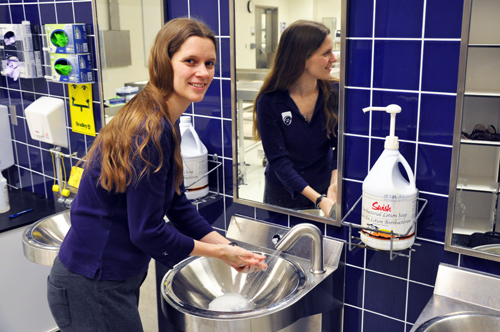
For Maureen Anderson, the decision to become a veterinarian was an easy one. She was inspired as a teen while assisting her cousin and uncle, both veterinarians, on calls. However, she never thought she would be a primary researcher 14 years after first arriving at the Ontario Veterinary College in 1998.
“If you had told me then (when I was in vet school) that I’d end up doing this much research, I would have looked at you like you had two heads,” she says. “It just goes to show you never know where you’ll end up.”
Now Anderson has nearly completed her PhD in the Department of Pathobiology, which will be her third degree from Guelph. The focus of her thesis is on the use of hand hygiene and other infection control measures in veterinary clinics to prevent the transfer of infectious diseases.
Anderson worked at the Listowel Veterinary Clinic after graduating with her doctor of veterinary medicine in 2003. She was hired to treat primarily large animals such as cows and horses, but eventually found herself treating smaller animals.
“Working at the practice was great and so valuable in terms of experience,” the Montreal native says. “I wouldn’t change it for anything.”
Her career path took a turn when pathobiology professor Scott Weese, whom she had kept in touch with, told her a large-animal medicine residency was available. She resigned from the clinic and began her doctor of veterinary science (D.V.Sc.) at OVC in 2005.
“The professors are great and take a real interest in their students,” says Anderson. “We have a nice community here. I was happy to come back.”
Her D.V.Sc. thesis was on methicillin-resistant Staphylococcus aureus (MRSA), an antibiotic-resistant superbug that can transfer from horses to humans and back. That’s when she first started talking about hand hygiene as a key measure for controlling the spread of MRSA.
Following completion of her residency, she worked as a post-doc with Weese, creating resource sheets on preventing the transfer of zoonotic diseases (infectious diseases that can transfer between species). They started a blog called Worms and Germs (www.wormsandgermsblog.com) to distribute the information.
In 2009, Anderson received a three-year fellowship from the Canadian Institutes of Health Research to complete her PhD and knew what she wanted to do for her thesis.
“I was constantly writing about hand hygiene for our resource sheets. At the time, hospitals had started reporting statistics on hand hygiene compliance, but this wasn’t a focus in vet clinics,” she says. “In vet clinics there are diseases that can be spread from animals to people, and sometimes vice versa, as well as animal to animal. Hand hygiene is easy to do and is cost-effective.”
Anderson started by observing hand hygiene practices at a petting zoo and attempting to improve them. Then, for two weeks at a time, she set up cameras in 51 veterinary clinics from Ottawa to Windsor. After the two weeks, she would put up posters with the slogan “Pause to clean your paws,” reminding staff to wash their hands or use hand sanitizer, and had the cameras up for one more week to record the results. It was exhausting, but she hopes the results will ultimately help improve the standard of care in veterinary medicine.
“I drove 16,000 kilometres visiting clinics and I’ve been coding videos for 17 months,” she says. “I’m hoping to complete the analysis and finish the thesis by February. As in human hospitals, there is certainly room for improvement when it comes to hand hygiene in veterinary clinics, but hopefully the results will help tell us what we do relatively well and where we can improve the most.”
Anderson still enjoys clinical practice and does emergency work in the large animal clinic at OVC’s Health Sciences Centre. With her thesis complete, she hopes to have more time for her other passions, which include ultimate frisbee, hockey (she plays on one of the OVC staff intramural teams), and choir, as well as spending time with her two cats, Bonnie and Clyde, and her partner, Michael. She also wants to continue to teach and present at conferences.
She is considering future work in academics or with government such as the Public Health Agency of Canada, which she has worked with in the past. Still, she knows that plans can change in an instant.
“I’m doing more research than I ever thought I would,” Anderson says. “It’s amazing where you end up. I still enjoy my clinical work and find it very satisfying when I can help an animal or prevent it from getting sick, but I’ve been pleasantly surprised by how much I enjoy working in research as well. ”